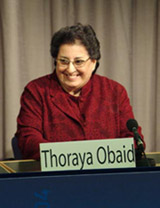Press release
More Funding Needed to Back Strong Commitment to Reproductive Health and Women's Rights, UNFPA Executive Director Tells NGO Global Meeting
31 August 2004LONDON—Developing countries are making real gains in promoting reproductive health and women’s rights, but they are hampered by inadequate support from rich nations and serious problems persist, Thoraya Ahmed Obaid, Executive Director of UNFPA, the United Nations Population Fund said today.

She was speaking at Countdown 2015, a global round table meeting organized by non-governmental organizations to mark the 10th anniversary of the 1994 International Conference on Population and Development (ICPD) in Cairo. Some 700 participants from 109 countries are assessing progress in meeting the goals of the ICPD, which linked poverty alleviation to women’s advancement and improved access to reproductive health care.
"Countries have made the ICPD Programme of Action part of their national agendas," Ms. Obaid said in a plenary discussion on global changes since the Cairo Conference. In regional review meetings, they have reconfirmed their commitment to the programme despite pressure not to do so, she noted. “They say, ‘Nobody can tell us to change it,’” she added.
At a press conference, Ms. Obaid said a recent UNFPA survey answered by 169 governments confirmed that most countries have taken steps since 1994 to empower women and address key reproductive health concerns. But it also showed that much more needs to be done to improve maternal health, slow the spread of HIV/AIDS and ensure adequate supplies of essential contraceptive commodities.
"In 2004, it is a crime that women still die because they are having babies," she declared, referring to the persistence of high maternal death in many developing countries, especially among the poor and young women. "We know what to do: increase access to skilled access at birth and to emergency obstetric care."
"Because it is poor women who are suffering and dying, maternal mortality is a crisis that does not get the urgent attention it deserves," she added in a later working group discussion.
"Half of the 14,000 people newly infected each day with HIV are women, and half are between ages 15 and 24," Ms. Obaid told reporters. We must ensure that young people have the knowledge and means to protect themselves."
Support from developed countries for reproductive health programmes falls far short of commitments made at the ICPD. Donors’ share of funding for contraceptive supplies and condoms for HIV/AIDS prevention has declined by one third since 1994, and needs for such commodities will grow 40 per cent by 2015.
An increase in funds for the ICPD action plan is critical to realizing the United Nations Millennium Development Goals for 2015, including halving extreme poverty and hunger, slowing the spread of HIV/AIDS, empowering women and reducing maternal mortality. “Unless serious attention is given to reproductive health,” Ms. Obaid asserted, “the MDGs cannot be achieved.”
Also addressing the press conference were Steven W. Sinding, Director-General of the International Planned Parenthood Federation (IPPF), and Dr. Fred Sai, Adviser to the President of Ghana on Population, Reproductive Health and HIV/AIDS and a key figure at the 1994 Cairo conference. Both spoke in the meeting’s opening session.
Countdown 2015 is "the result of an amazing collaboration among key networks of NGOs” to identify what needs to be done to achieve the goals set at the ICPD for 2015, Mr. Sinding stated. “We must learn from the successes and failures of the last 10 years and apply that knowledge to the next 10 years," he said.
Towards that end, working groups will make recommendations on key topics including HIV/AIDS, poverty, safe motherhood, human rights, sexuality and abortion. These will be incorporated in a final declaration addressed to world leaders and policy makers.
The meeting is an initiative of Countdown 2015: Sexual and Reproductive Rights for All, a coalition launched by Family Care International, IPPF and Population Action International. These three groups today released a "report card" grading countries on their progress in implementing the ICPD programme. It found that 23 countries have made significant advances, while 17 have achieved little or even lost ground.
***
UNFPA is the world’s largest multilateral source of population assistance. Since it became operational in 1969, it has provided help to developing countries, at their request, to meet reproductive health needs and support development efforts.
Contact Information:
Kristin Hetle
Cell Phone: +1-917-378-5957
Email: hetle@unfpa.org
William A. Ryan
Cell Phone: +66 89 897 6984
Email: ryanw@unfpa.org